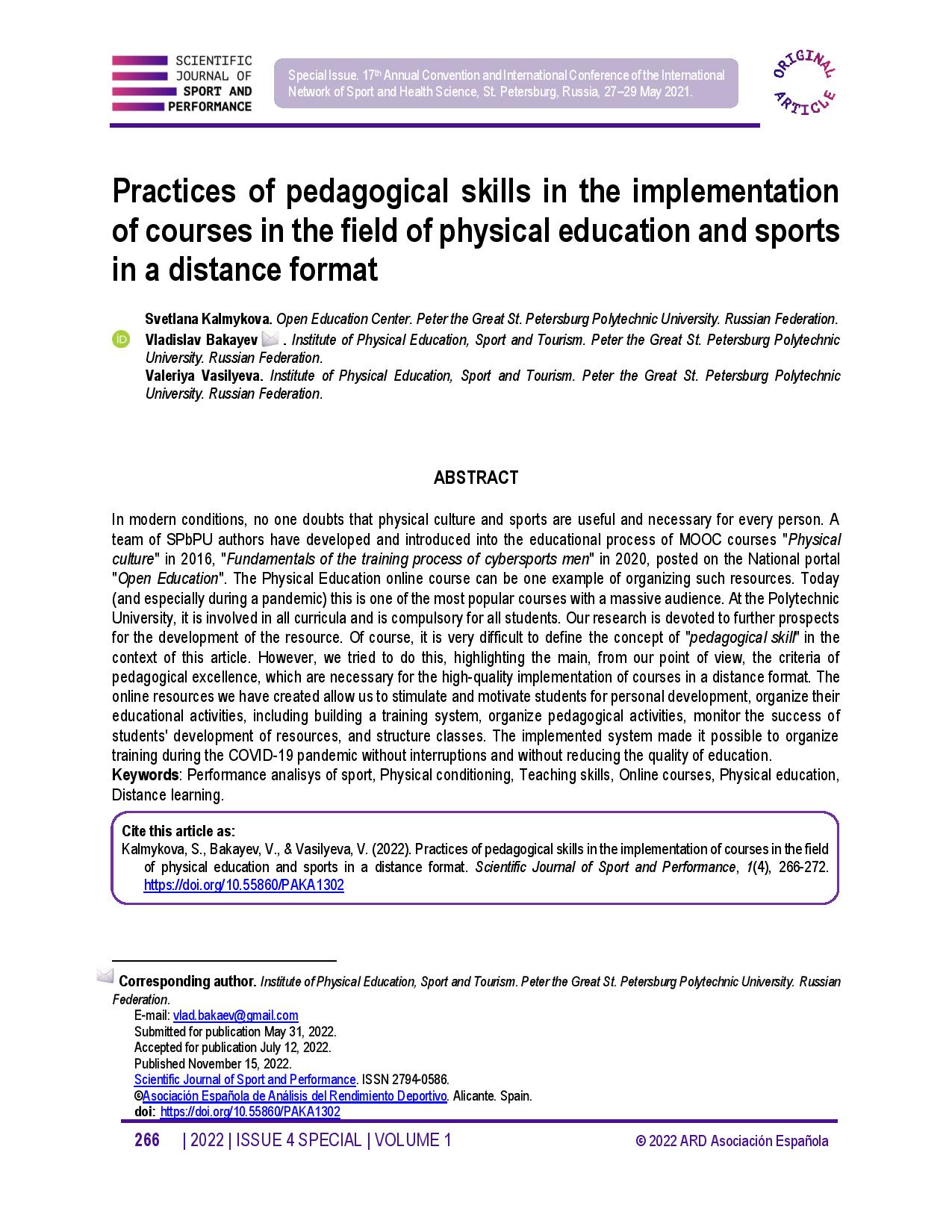Practices of pedagogical skills in the implementation of courses in the field of physical education and sports in a distance format
Main Article Content
Abstract
In modern conditions, no one doubts that physical culture and sports are useful and necessary for every person. A team of SPbPU authors have developed and introduced into the educational process of MOOC courses "Physical culture" in 2016, "Fundamentals of the training process of cybersports men" in 2020, posted on the National portal "Open Education". The Physical Education online course can be one example of organizing such resources. Today (and especially during a pandemic) this is one of the most popular courses with a massive audience. At the Polytechnic University, it is involved in all curricula and is compulsory for all students. Our research is devoted to further prospects for the development of the resource. Of course, it is very difficult to define the concept of "pedagogical skill" in the context of this article. However, we tried to do this, highlighting the main, from our point of view, the criteria of pedagogical excellence, which are necessary for the high-quality implementation of courses in a distance format. The online resources we have created allow us to stimulate and motivate students for personal development, organize their educational activities, including building a training system, organize pedagogical activities, monitor the success of students' development of resources, and structure classes. The implemented system made it possible to organize training during the COVID-19 pandemic without interruptions and without reducing the quality of education.
Article Details

This work is licensed under a Creative Commons Attribution-NonCommercial-ShareAlike 4.0 International License.
References
Bakayev, V. (2015). Determining the significance of practical military skills applied by the special purpose regiments of the Internal Troops of the Russian Ministry of Internal Affairs to deliver combat objectives. Journal of Physical Education and Sport, 15(4), pp. 615-618.
Bakayev, V., Vasilyeva, V., Kalmykova, S., & Razinkina, E. (2018). Theory of physical culture - a massive open online course in educational process. Journal of Physical Education and Sport, 18(1), 293- 297. DOI: 10.7752/jpes.2018.01039 DOI: https://doi.org/10.7752/jpes.2018.01039
Bespalko V.P. (1995). Pedagogy and progressive teaching technologies. Moscow, p412.
Bolotin, A., & Bakayev, V. (2017). Success criteria of the pedagogical pattern of physical training on self-guide basis with individual assignments among futsal referees. Journal of Human Sport and Exercise, 12(3), 607-615. doi:10.14198/jhse.2017.123.05 DOI: https://doi.org/10.14198/jhse.2017.123.05
Bolotin, A., & Bakayev, V. (2018). Scientific and Theoretical Prerequisites for Improvement of Modern Pedagogical Technologies, In N. Llevot-Calvet & O. Bernad (Eds.) Advanced Learning and Teaching Environments Núria Llevot, IntechOpen (pp. 195-221). Cavero: IntechOpen. DOI: 10.5772/intechopen.72342. DOI: https://doi.org/10.5772/intechopen.72342
Garavan, T., O'Brien, F., Duggan, J., Gubbins, C., Lai, Y., Carbery, R., Heneghan, S., Lannon, R., Sheehan, M. & Grant, K. (2020). Learning and Development Effectiveness in Organisations: An Integrated Systems-Informed Model of Effectiveness. 10.1007/978-3-030-48900-7. DOI: https://doi.org/10.1007/978-3-030-48900-7
Kerry, T. (2021). Ethics for Teachers and Middle Leaders: A Practical Guide (1st ed.). Routledge. https://doi.org/10.4324/9781003136606 DOI: https://doi.org/10.4324/9781003136606-1
Littlejohn, A. and Milligan, C. (2015). Employers are becoming aware of the potential of Massive Open Online Courses (MOOCs) as a significant form of learning for work. eLearning Papers 42. http://www.openeducationeuropa.eu/en/download/file/fid/39594
Makarova E. and Makarova E. (2018). “Blending pedagogy and digital technology to transform educational environment.” International Journal of Cognitive Research in Science Engineering and Education, vol. 6, no. 2, pp. 57–65. DOI: https://doi.org/10.5937/ijcrsee1802057M
Obidallah, W.J., Raahemi, B. and Ruhi, U. (2019). Clustering and association rules for web service discovery and recommendation: a systematic literature review. SN Comput. Sci. 1(1), 1–33. https://doi.org/10.1007/s42979-019-0026-8 DOI: https://doi.org/10.1007/s42979-019-0026-8
Olesov, N. P., Sergin, A. A., Alekseev, V. N., Nikiforov, N. V., & Baishev, I. I. (2020). Preparing Students of the Institute of Physical Education and Sport to Use Distant Learning Technologies in the Course of Pandemic. Journal of Educational Psychology - Propositos y Representaciones, 8(S3), e709. https://doi.org/10.20511/pyr2020.v8nSPE3.709 DOI: https://doi.org/10.20511/pyr2020.v8nSPE3.709
Open Education - https://openedu.ru/
Pikan B.V. (2005). Management of Variative Education in School. Monograph. - Moscow, - 270 p.
Popovic, S., Zarubica, M., Vukovic, J., & Matic, R. M. (2021). Attitudes and Preferences of Students in Sports Science Concerning the Use of E-Learning and Social Media at the University of Novi Sad. Sport Mont, 19(2), 11-15. doi: 10.26773/smj.210616 DOI: https://doi.org/10.26773/smj.210616
Slastenin V.A., Isaev, E.N. & Shiyanov; Ed. (2002). Pedagogy. Textbook for students of higher educational institutions. – Moscow. Publishing Center "Academy", - 380 с.
Suárez-Llorca C, Carrasco-Embuena V, Fourcade-López A, Chinchilla-Mira JJ, & Andreu-Cabrera E. (2010). The effects of the use of blogs on the learning process of sea sports in the framework of higher education. J. Hum. Sport Exerc., 5(2):288-294. DOI: https://doi.org/10.4100/jhse.2010.52.16
Toni Mohr, A., Holtbrugge, D., & Berg, N. (2012). Learning style preferences and the perceived usefulness of eLearning. Teaching in Higher Education, 17(3), 309-322. DOI: https://doi.org/10.1080/13562517.2011.640999
Yan L., Yin C., Chen H., Rong W., Xiong Z. & David B. (2021) Learning Resource Recommendation in E-Learning Systems Based on Online Learning Style. In: Qiu H., Zhang C., Fei Z., Qiu M., Kung SY. (eds) Knowledge Science, Engineering and Management. KSEM 2021. Lecture Notes in Computer Science, vol 12817. Springer, Cham. https://doi.org/10.1007/978-3-030-82153-1_31 DOI: https://doi.org/10.1007/978-3-030-82153-1_31




